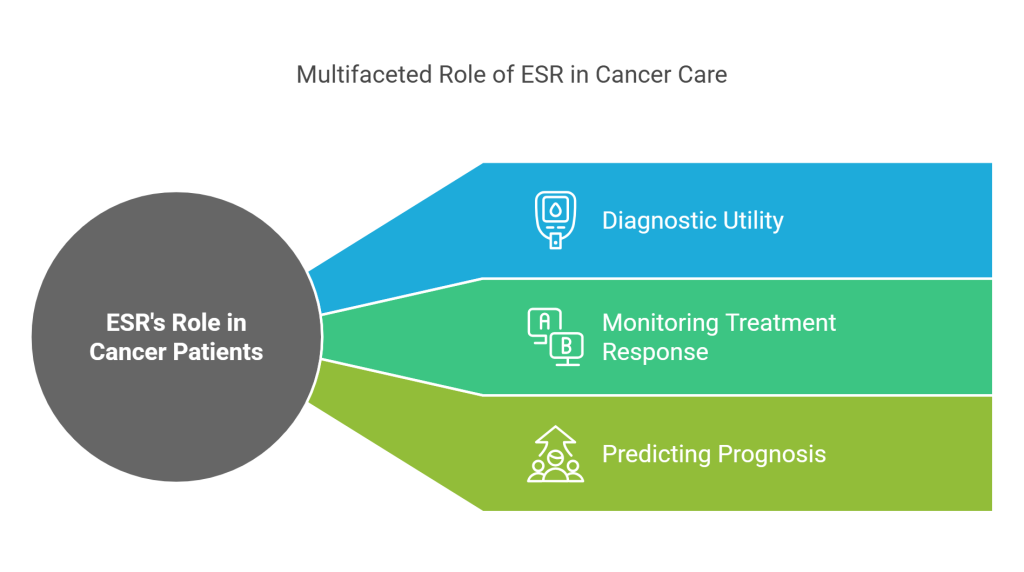Cancer remains one of the most challenging diseases, not only in terms of treatment but also in how it is diagnosed and monitored. In the world of oncology, various biomarkers and tests are used to understand the extent of the disease and how well a patient is responding to treatment. One such test is the Erythrocyte Sedimentation Rate (ESR), a simple and inexpensive laboratory test that can provide critical information about the inflammatory state in the body, which is often elevated in cancer patients. In this detailed exploration, we also consider the role of the best cancer hospital in Ranchi in offering advanced diagnostic and treatment services.
What is Erythrocyte Sedimentation Rate (ESR)?
The Erythrocyte Sedimentation Rate (ESR) test measures the rate at which red blood cells settle in a tube of blood over a specified period. This rate of sedimentation is influenced by the levels of certain proteins in the blood, which increase in response to inflammation. ESR is a non-specific test and is not diagnostic of a particular disease, but it is useful as a general marker of inflammation.
How is ESR Related to Cancer?
In the context of cancer, an elevated ESR can indicate the presence of inflammation, which is commonly associated with tumor development and progression. Inflammation plays a pivotal role in the cancer microenvironment, contributing to proliferation, angiogenesis (formation of new blood vessels), and metastasis (spread of cancer). Therefore, monitoring ESR levels can be crucial in assessing the progression or remission of cancer.
Why ESR Matters in Cancer Patients

1. Diagnostic Utility: While ESR alone cannot diagnose cancer, it can be used alongside other tests to help confirm or rule out diagnoses. For instance, in cancers such as lymphoma or multiple myeloma, ESR can be significantly elevated.
2. Monitoring Response to Treatment: Changes in ESR levels can indicate how well a patient is responding to treatment. A decreasing ESR may suggest that the body’s inflammatory response is decreasing, which typically aligns with effective cancer treatment.
3. Predicting Prognosis: Several studies have shown that higher pre-treatment ESR levels can be associated with a poorer prognosis in various cancers. This is because high inflammation levels are linked to more aggressive disease.
Best Practices for ESR Testing
For accurate results, ESR testing must be done under standardized conditions. Blood must be drawn using proper technique to avoid hemolysis (breakdown of red blood cells) which can falsely alter ESR readings. It is also crucial for patients to inform their healthcare providers about any medications they are taking, as some drugs can influence ESR results.
Best Cancer Hospital in Ranchi
When dealing with a diagnosis like cancer, choosing the right hospital for treatment and regular monitoring, including tests like the ESR, is crucial. The best cancer hospital in Ranchi offers state-of-the-art facilities, experienced oncologists, and comprehensive care tailored to each patient’s unique needs. These hospitals are equipped with advanced technologies for precise diagnosis and treatment, making them pivotal in the fight against cancer.
Incorporating ESR into a Comprehensive Cancer Care Plan
Oncologists often use ESR tests as part of a broader array of assessments to understand a patient’s overall health and the tumor’s behavior. It’s one component of a multifaceted approach to cancer care, which may also include:
- Imaging tests: Such as MRIs, CT scans, and PET scans to visualize the tumor.
- Biopsies and molecular testing: To examine the cancer cells more closely.
- Complete blood counts (CBC): To check for anemia or signs of infection.
- Markers specific to cancer types: Such as PSA for prostate cancer or CA-125 for ovarian cancer.
Conclusion
Understanding the ESR level in cancer patients is crucial as it provides insights into the inflammatory status of the body, which is intimately linked to cancer progression. While not a standalone diagnostic tool, ESR is valuable in conjunction with other diagnostic assessments, offering clues about prognosis and the effectiveness of treatment. For residents in Ranchi, accessing care at a leading cancer facility ensures that such tests are part of a coordinated and strategic approach to cancer treatment.
As cancer care continues to evolve, integrating simple yet informative tests like the ESR can significantly impact the management and outcomes of cancer treatment, underscoring the importance of comprehensive care in specialized facilities like the best cancer hospital in Ranchi.
.svg)










